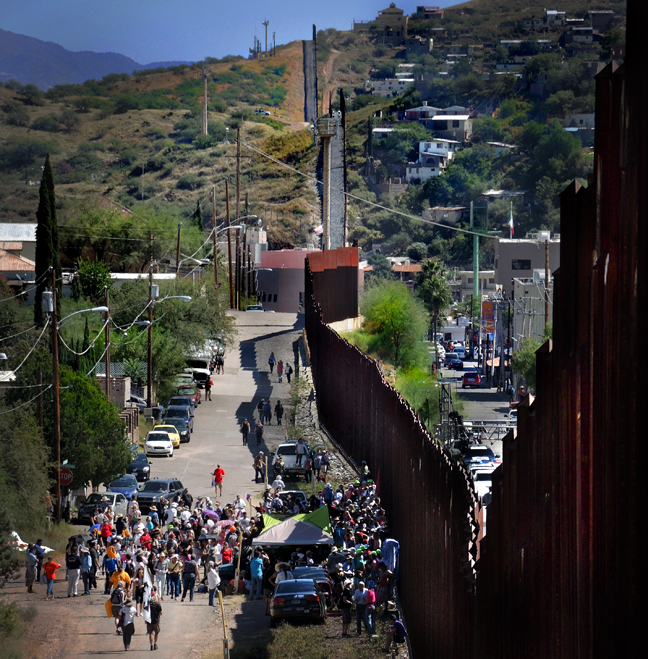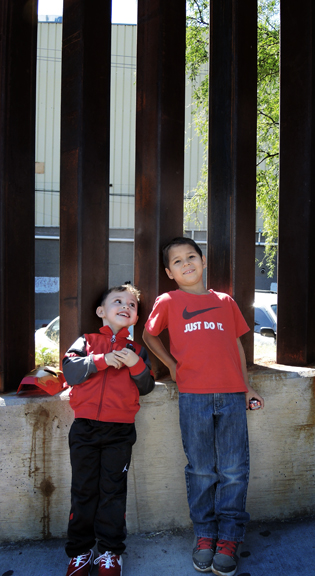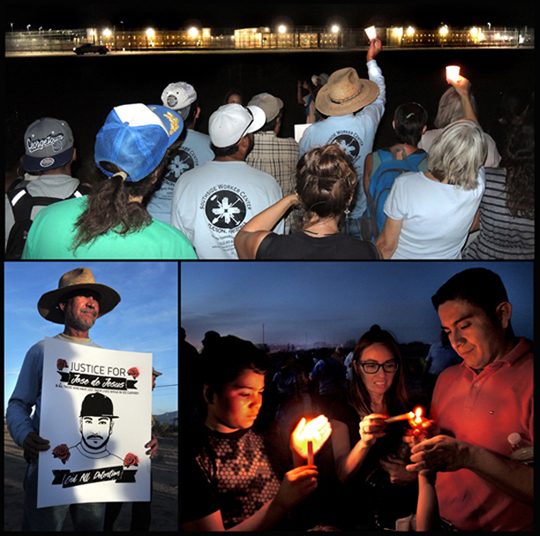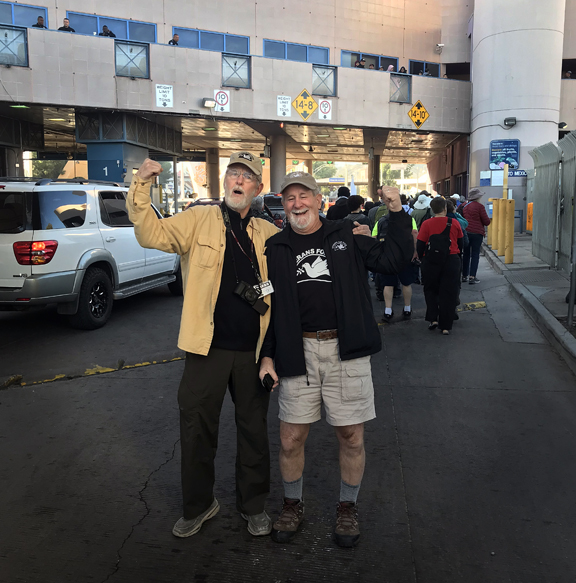The far-right is focused hard on making a scandal of the current rush of refugees from Central America north through Mexico to our Southwestern border. It’s as if the refugee crisis on the border is a new Democratic Party scandal, instead of a festering hemispheric crisis-point that has been exacerbated but never seriously addressed. This avoidance helped it grow over the decades into today’s mess.
It’s an old story. The US government consistently avoids any kind of honest analysis of issues like this. Because we’re top o’ the world and want to stay that way, the rule is, admit nothing. Plus, anything in today’s virtual world can be made so damned confusing that it makes getting anything done impossible. Thus, it becomes a military problem. Last Friday, Bill Maher had a libertarian editor of Reason magazine on his show. Maher made a bald statement that the issue with refugees at our southern border had to do with one thing: “Drugs.” The libertarian interrupted him: “No! It’s The Drug War!” A famous weed smoker, Maher agreed wholeheartedly.

[ The border from the US side of Nogales. Photos: John Grant 2018 ]
Here’s the bottom line: One cannot make sense out of the influx of poor refugees north to the US border without significantly factoring in imperial/military involvement between the United States and the tiny, poor nations of Central America. It all started with the notorious 1954 coup in Guatemala, during which the CIA did a number of things to bamboozle the citizens of Guatemala in a classic coup that removed a duly-elected progressive reform president, replacing him with a ruthless military general. The government ushered in quickly established itself as a cruel military machine that has ruled Guatemala ever since with an iron hand covered by a weak fig leaf of democracy. In the 1970s and ‘80s, hundreds of thousands of Mayan Guatemalan peasants were slaughtered in upland Guatemala; for the victims, it was a holocaust that led to the creation of a peasant liberation army.
In 1932, the tiny, over-populated nation of El Salvador, for example, suffered what is known as La Matanza or the massacre. It started when the peasantry in western Salvador became fed up with being crushed and responded violently. Rich land owners and the military turned on the Mayan peasantry and slaughtered over 30,000 people in a matter of days. After La Matanza, peasants in El Salvador stopped wearing indigenous clothing, since it was what had marked individuals for death.
In the 1980s it all blew up and President Ronald Reagan decided to support the far-right, fascist elements over the poor peasantry, which had suffered decades, even centuries, of oppression and violence. It was a North/South conflict (ie, a struggle between wealthy haves who wanted to keep what they have and the poor have-nots from whom land, rights and power had been expropriated by violence since the beginning. Reagan’s Wars were a matter of the powerful, wealthy United States taking the side of the violent far-right against justice itself. This was during the last days of the Cold War, when wars fought by the poor for justice were intentionally mis-characterized as East/West struggles between capitalism and communism, specifically the post-WWII US and the Soviet Union.
I’ll never forget the young history professor named Fabricio I met in San Jose Las Flores, Chalatenango, on Christmas Eve 1986. He was a lieutenant in the FMLN, the Farabundo Marti National Liberation Front, and his unit had descended on the small mountain village of San Jose Las Flores for R&R, specifically to celebrate Christmas and be part of a torch-lit re-enactment led by a priest of Mary & Joseph trying to find shelter. Later that night, a big boom box appeared and the gringos danced with the guerrillas to Credence Clearwater Revival and the Rolling Stones. The dashing Fabricio romanced a young gringa in our party. I watched my wife do some of her free-form snake dancing with a guerrilla. I talked literature with a young female doctor from Europe who was carrying an M16 and fighting with the FMLN. When I returned to San Jose Las Flores a year later, I learned that Fabricio had been killed in a firefight. Experiences like that made me see the problems of the poor in places like El Salvador as something real, even personal — not something one can detach from using the usual social insulation and buffering that helps keep the USA ruthless and “exceptional.”
It’s unclear exactly when the cruel and tragic relationship between the US and Central America shifted from its ideological, anti-communist Cold War mission to a focus on the supply of cocaine and marijuana to meet the demand for drugs up north in Gringolandia. Of course, it’s a fact that the illicit drug business follows all the rules of capitalism, free-private enterprise and risk. And it’s well known to many that our current president — Joe Biden — was/is one of the key founders and legislative supporters of this misguided American Drug War. During his long senate career, Biden defended the Drug War, at times a belligerently, while on the domestic front he joined segregationists in support of massive police and crime bills. These legislative efforts ended up incarcerating a huge number of African American males, many who remain locked up because it’s easier in this culture to lock someone up than it is to set them free. This, of course, is the exact same dynamic that Veterans For Peace likes to emphasize: How it’s easier to start a war than it is to end one. In that sense, what we need to do is end our war with the poor in Central America.

[ Two boys on the Mexican side of la frontera. The fate of children, who represent the future, has become a major issue in the border crisis. It’s past-time to re-negotiate our relationships with Central America and Mexico with the future in mind. Just do it! ]
The idea of defining Central American refugees as an offensive element out to soil our exceptional culture and steal the jobs of good, honest white Americans and others lucky enough to be born in the US is a simple and malicious reduction that needs to be countered. If there’s any interest at all to solve the immigration crisis on the southern border, that crisis needs to be shown for what it is, something based on official lies. It’s clear certain elements seek to exacerbate border tensions in order to beef-up an already heavily over-militarized border.
The problem needs be seen in the light of history. Specifically, how much of the history of the United States vis-à-vis Central America has been about the brutal application of US military power to support the interests of local allies in the elite business/capitalist classes and to, accordingly, further crush the poor of Central America?
Corruption in all aspects of The Drug War is, of course, the armature running through dozens of popular films about the US Drug War, starting with Traffic. The 2009 coup in Honduras is wrapped up in all this. President Obama and Secretary of State Hillary Clinton have significant blood on their hands due to their moral failure following a coup that removed at gunpoint a duly-elected progressive president. The US then introduced into Honduras dozens of small US Drug War military bases to monitor the movement of drugs from South America north. Coincident with the coup was a terrifying rise of violence in Honduras that focused on the poor, especially anyone opposed to the coup. Why did Obama do this? Was it convenience, even cowardice? Was it a case of: We’re against the coup and only supported it so we could continue to have influence inside the tent. The honorable thing would have been to stand outside the tent and to demand President Zelaya be returned to office — pronto! After all, he was tossed out precisely because he wanted to have a constitutional convention to save the tiny, nation from the corruption that led to the coup.
During the Contra War, the place was known among imperialists as “Aircraft Carrier Honduras.” The word honduras means “depth” (and “ditch”) in Spanish. Next to Haiti, Honduras is the basket-case nation in the western hemisphere. Historically, everybody has their way with Honduras. So, no surprise, following the coup, the poor found themselves even worse off than before. The leaders of the coup clearly felt no responsibility whatsoever toward the poor; because they were concerned with filling the coffers of their own elite lives.
While the coup linked up with the US military in its Drug War efforts, it also liberated criminal elements interested in terrorizing and exploiting the poor. It put the poor into a cruel vice that became tighter and tighter. Where does a poor man, woman or child turn when the ruthless — be they government forces or criminal elements — are empowered and feel free to threaten their lives? It’s analogous to when Black people, here, fed up with egregious cop killings begin to ask: “Who do you call?”
The answer is right in front of our faces: They flee for their lives in a life-threatening trek north to the US border. We gringos love to puff up our chests and take pride in how many people around the world long to come to our shores for a good life. It’s true: We are a nation of immigrants. Immigrants displaced the native people who lived here by means of a centuries-long campaign of genocide. This brought more immigrants. When Manifest Destiny slammed into the Pacific Ocean, it taught kids like me to kill and sent us off to Southeast Asia.

[ Let my people go! A protest in 2018 outside a huge detention center for Central American and Mexican refugees near Phoenix. ]
The question is, at this moment in the 21st century, does International Justice matter at all? Or is all just about Power? If it can be shown that aggressive US action (or inaction) contributed to, or exacerbated, the current tensions on the US/Mexico border, then, the USA is culpable. The US owes something to the many poor Hondurans scrambling for their lives toward our border. We’re the people who voted for rotten leaders and paid tax dollars to support the historic oppression of poor Central American’s lives. We who live in the American Carnival at least owe the Central American poor a constructive re-analysis of the conditions that persist from the disastrous US Drug War and from those misguided Reagan Wars. In synch with that, we also owe the poor in Honduras a re-visiting of President Zelaya’s idea of a new Honduran constitution.
Meanwhile, the idea seemingly held by poor Central American immigrant/refugees of an honorable, beneficent and generous United States of America is, of course, the exact same patriotic boilerplate horseshit used to justify Reagan’s Central American Wars. Boilerplate aside, in our relationship with Central Americans everything has been ideologically designed to crush the desires of the poor for dignity and a chance to thrive. One might look at this political dynamic in Central America of suppressing the ambitions of poor human beings as the big-dog second-cousin of the recent voter-suppression laws legislated in Georgia. Today’s far-right Republicans may have learned a lot from their allies in Central American.
The Biden Administration would be smart to get together with Latin American leaders in a major hemispheric Dialogue that, among other things, focuses on the Drug War and re-evaluates US involvement in Central America since the 1954 Guatemala coup — including the decision to blockade Cuba and turn it into a powerful symbol for opposing the imperial USA. It would be irresponsible not to include in such a hemispheric Dialogue a robust discussion of the environment, since the effects of drought and other symptoms of climate change add to the pressure on the poor of Central American to flee north for safety.
Such a Dialogue would have to be honest, frank and pragmatic with an eye toward justice. Forgiveness would be encouraged to facilitate moving-on. The lurking danger lies in a shortage of courage, a lukewarm concern for justice and a partisan/sectarian falling back on the tiresome tropes of the Cold War and the Drug War — the two things that created, and exacerbated, the crisis in the first place.

[ CODA: The author, left, with wounded Vietnam veteran Frank Corcoran on the US side of the border, following their participation in a 2018 cross-border protest. Note a US border agent, top left, filming these vets goofing around. They did not seem interested in thanking us for our service. ]
